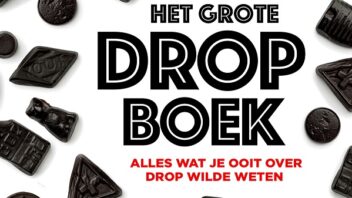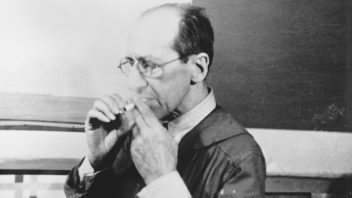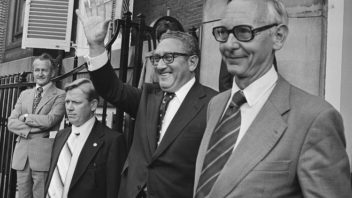WFH Complete Works part 10 published
“There’s a curse on what I write on comission.”
By Peter Kegel, Bram Oostveen and Marc van Zoggel
When Ischa Meijer asked about Willem Frederik Hermans’ opinion on the Dutch stage in 1970, the author made a very clear statement: ‘It would be better to start a ski school in tropical Africa than to start writing plays in this country’. A series of disappointing experiences in the fifties and sixties had caused Hermans to experience writing scenarios for theatre, television and film ‘with ever decreasing enthusiasm’. He felt challenged by the technical demands of the dramatic genre, ‘but gradually you get tired of all the setbacks, limitations and lack of interest’.
*
At the end of the occupation of Nazi Germany and shortly after the liberation, Hermans had written two comedies, ‘Modelgevangenis’ (Model prison) and ‘De hemelvaart der dwaze maagden’ (The ascension of the foolish virgins), both of which remained to his own. His first success was the one-act ‘Het omgekeerde pension’ (1952), with which Hermans won a competition organised by the cpnb on the occasion of the Boekenweek in 1953. The piece was performed on the opening night by an amateur company, but because the Netherlands had just been hit by the Flood Disaster, the mood was not very festive.

‘Dutch comfort’ (1953), situated in the grim aftermath of the Second World War, was described by him as ‘a test of popular theatre’. He submitted it for the Toneelprijs of the city of Amsterdam, but the prize was not awarded that year. A television registration by the Vara was also cancelled, because Hermans said he ‘critized too much sacred matters’, or in the more veiled words of a representative of the broadcaster: ‘because a number of issues had been raised in such a way that we said: this is so unnecessary’.
*
It was not until the end of the 1950s that Hermans made another attempt, when the experimental theatre group test offered him a commission. About the result, the ‘epistemologische tragedie’ (epistemological tragedy) and ‘De psychologische test’ (The psychological test) (1960), he was very pleased: ‘It will be a killer piece, at least if everything is done, as I say it must be! The piece was played by Het Rotterdams Toneel, but Hermans did not approve of the performance. He walked away during the premiere, despite his wife’s admonitions: ‘Oh, come on, don’t be silly!’.
In the meantime, the writer had become entangled in a feud with his publisher Geert van Oorschot, who had brought the wrath of his protégé upon him by reprinting his work in a cheap series without permission, and then saw himself portrayed in the magazine Podium as ‘Uitgever Oorwurm’ (Whiner Publications)(1962). Hermans found a new publishing house in De Bezige Bij, which published ‘Het omgekeerde pension’, ‘Dutch comfort’ and ‘De psychologische test’ in the spring of 1962 under the title ‘Drie Drama’s’ in book form (Three dramas).

At almost the same time, De woeste wandeling (The Wild Walk) appeared, a film scenario that Hermans had written in 1959-1960 on behalf of the Ministry of Education, Arts and Sciences. After reading De donkere kamer van Damokles (The Dark Room of Damocles, 1958), the head of the Arts department of the ministry was sure that Hermans would also master an exciting film script. De donkere kamer was therefore strongly staged by the author: in a letter to Dutch literature scholar Frida Balk-Smit Duyzentkunst he had described his novel as ‘Hamlet played in curtains and ready-made suits’. However, no interested director was found for De woeste wandeling, on the theme of the post-war housing shortage.
*
De donkere kamer van Damokles was filmed by Fons Rademakers titled Als twee druppels water (Like two drops of water) in 1963. In a reflection on his involvement in the film, Hermans also touched on the ‘King Kong affair’: the alleged betrayal of Operation Market Garden by the double agent Christiaan Lindemans, alias King Kong. The inability of researchers to uncover the truth about this issue was a perfect illustration for Hermans of what he had wanted to demonstrate with De donkere kamer van Damokles, which was ‘… that the truth of the historian, in comparison with that of the physicist, is little more than a fable, a myth or the delusional system of a paranoid idiot‘.
When Hermans was commissioned by the city of Amsterdam in 1967 to write an ‘authentic play’, he sent in a scenario about King Kong. It was rejected by a committee because it would be impossible to play. Hermans had therefore made it into a documentary editing stage: it consisted for the most part of long, glued together quotations from the reports of the interrogations of the Parliamentary Inquiry Committee on Government Policy 1940-1945, which, among other things, had investigated the role of Lindemans.

In the meantime, Hermans had also offered ‘King Kong’ to the ntr (Dutch Television Foundation; the predecessor of the nos) without the knowledge of the city of Amsterdam. The broadcaster called in Loe de Jong for advice because ‘not only artistic but also historical standards were at stake’. Hermans was not pleased with this manoeuvre: ‘What about television, should Loe de Jong’s permission be granted, if they want to perform a piece that has the occupation as a central theme?’ ‘King Kong’ was neither performed nor shown on television. Provided with an extensive review of the commotion surrounding the doubles by Hermans, it was finally published in 1972 as King Kong, gevold door wat Nederland niet op de televisie mocht zien (King Kong, followed by what the Netherlands was not allowed to see on television).
*
Hermans later wrote another scenario: ‘Periander’ was his contribution to a series of television films based on Herodotus’ Histories. The creation of this production was also extremely difficult – the book edition Periander (1974) even appeared a few months before the television registration – but the critics considered the film to be the best contribution to the series. Hermans was less enthusiastic about the adjustments that the director, Ruud van Hemert, had made to the screenplay. For example, the tyrant of Corinth had become a reactionary dictator: ‘Ruud van Hemert came to Paris with a PhD student in classical languages and spent an entire afternoon talking to me. And what is the result: Periander appears on the screen, dressed in robes on which swastikas can be admired! / A curse rests on what I write in commission.

With the exception of ‘Uitgever Oorwurm’, which was included by Hermans in De laatste roker (The last smoker) (1991) (now in VW 8), the published plays and scenarios have been brought together in part 10 of the Volledige Werken (Complete Works), published by De Bezige Bij and commissioned by WFHi and provided by the Huygens Institute for Dutch History. The editors of this part are Peter Kegel, Bram Oostveen and Marc van Zoggel.




